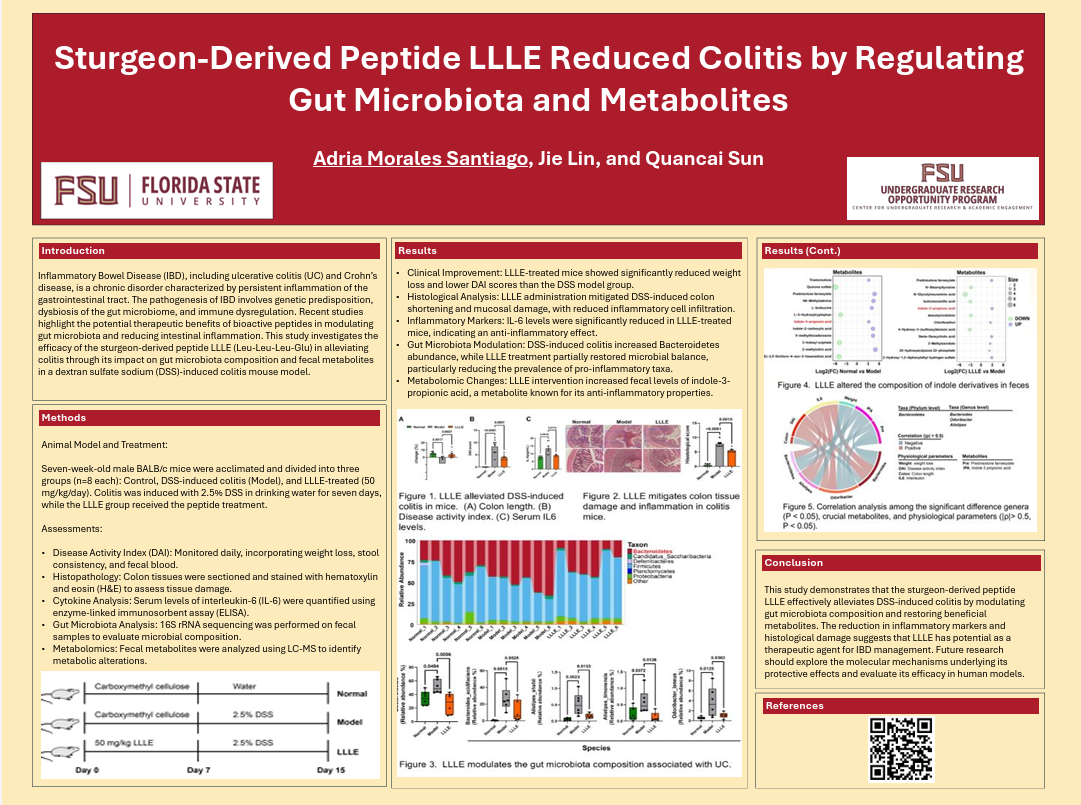Research Symposium
25th annual Undergraduate Research Symposium, April 1, 2025
Adria Morales Santiago Poster Session 4: 3:00 pm - 4:00 pm/ Poster #24

BIO
My name is Adria Morales Santiago, and I am a second-year student at Florida State University, majoring in Biological Sciences. Originally from Cuba, I moved to Naples, FL, in 2019. In addition to my academic work, I enjoy reading and spending time with my friends and family. I am passionate about the research I am involved in FSU and plan to pursue medical school after graduation to become a surgical oncologist or an oncologist.
Sturgeon-Derived Peptide LLLE Reduced Colitis by Regulating Gut Microbiota and Metabolites
Authors: Adria Morales Santiago, Dr. Quancai SunStudent Major: Biological Sciences
Mentor: Dr. Quancai Sun
Mentor's Department: Health, Nutrition, and Food Sciences Mentor's College: Anne Spencer Daves College of Education, Health, and Human Sciences Co-Presenters:
Abstract
Inflammatory bowel disease (IBD), which includes ulcerative colitis (UC) and Crohn's disease, is characterized by chronic inflammation of the gastrointestinal tract. The causes of IBD are multifactorial, influenced by genetic predisposition, changes in the gut microbiome, and immune system dysfunction, which contribute to its increasing prevalence worldwide. Recent research has identified a peptide derived from sturgeon that demonstrates significant anti-inflammatory properties, offering a potential therapeutic strategy for managing IBD symptoms. This study evaluates the efficacy of the sturgeon-derived peptide LLLE (Leu-Leu-Leu-Glu) in reducing inflammation and restoring gut homeostasis in a mouse model of colitis induced by dextran sulfate sodium (DSS). The findings indicate that LLLE treatment effectively reduced weight loss and improved disease activity index (DAI) scores in mice with DSS-induced colitis. Histological analysis revealed that LLLE treatment enhanced colon structural integrity, diminished tissue damage, and lowered levels of interleukin-6 (IL-6), a key inflammation marker. Moreover, 16S rRNA sequencing showed that LLLE modulated the gut microbiota by decreasing the DSS-induced increase in Bacteroidetes. A fecal metabolite analysis indicated that LLLE helped restore metabolites, such as indole-3-propionic acid, known for its anti-inflammatory effects. Future investigations may involve a comparative analysis of the effects of the sturgeon peptide in female versus male mice, as this study exclusively used male subjects. In summary, these findings suggest that the sturgeon-derived peptide has promise as a therapeutic intervention for colitis, potentially reducing inflammation, restoring gut microbiota balance, and replenishing essential metabolites.
Keywords: Inflammatory Bowel Disease, gut microbiota, metabolomics.

